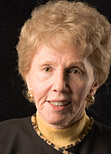July 28, 2009
Helen Goldkind discusses the humiliation she and her family experienced as they were forced by the Germans to move from their hometown of Volosyanka to the Uzhgorod ghetto in Czechoslovakia in 1944.
LISTEN
TRANSCRIPT
HELEN GOLDKIND:
He says, "I know you are worried that I’m in pain, but actually it’s how they humiliated me that hurted more."
NARRATOR:
Over 60 years after the Holocaust, hatred, antisemitism, and genocide still threaten our world. The life stories of Holocaust survivors transcend the decades and remind us of the constant need to be vigilant citizens and to stop injustice, prejudice, and hatred wherever and whenever they occur.
This podcast series presents excerpts of interviews with Holocaust survivors from the United States Holocaust Memorial Museum’s public program First Person: Conversations with Holocaust Survivors.
In today’s episode Helen Goldkind talks with host Bill Benson about the humiliation she and her family experienced as they were forced by the Germans to move from their hometown of Volosyanka to the Uzhgorod ghetto in Czechoslovakia in 1944.
BILL BENSON:
Tell us what happened in your community and your family once the Nazis were now in control and completely in power in Volosyanka.
HELEN GOLDKIND:
That’s a tough one to talk about. Once the Germans came in… you see what happens to me?
BILL BENSON:
Take your time.
HELEN GOLDKIND:
Once the Germans came in, they told that all the houses have to have a Star of David on the house. And we weren’t allowed to go out after a certain hour. You know, they closed the synagogue, but my grandfather was a relig… I mean we were religious Jews, so the older people went to my grandfather to pray, because he had a Torah scroll. He had six sons, so they managed to get a Torah scroll out of that, out of that synagogue.
BILL BENSON:
To, in order to save it?
HELEN GOLDKIND:
In order to save it. And, so the Jews weren’t allowed to gather. So, the religious Jews took, you know, all Jews, they took a chance and they went to my grandfather. So, my grandfather’s house became a synagogue, you know. They gathered there. In no time the Germans gave out an order that all the Jews should go to the square. But, what they also said that we can pack a small suitcase and take it with us, because we’re gonna be on a farm, and then we’ll come back.
So, everybody worried “What should we take?” You know, locking the doors. And my grandfather, all he wanted was the Torah scroll. Because he said, “Listen, our civilization comes from the Torah scrolls, from the Ten Commandments. And how are we gonna live who knows where?” So, he felt it was very important for him to have the Torah scrolls. So, my grandmother went and she wrapped the Torah scrolls in a white sheet, I remember. And, um…
You know, and we went to the, you know, to the square. When we got to the square, they took us with trucks to Uzhgorod, and that was a ghetto. You know, we were sleeping on the floor. It was a brick factory. That ghetto was a, you know, made out of a brick factory. And we really didn’t know what tomorrow would bring.
BILL BENSON:
So the whole Jewish community was forced into a brick, into a brick factory?
HELEN GOLDKIND:
Right. But my grandfather had a long beard. So they gave an order to, for the old people to come to the square, so my mother took my grandfather to the square. And, you know they took these Jews and they were cutting their beards, and they were beating them up, but there was nothing my mother could do, because then she would–oh my God.
She would get beaten up. So when they were finished with these old men, my grandmother, my mother brought him home, and he was all bloody. And he was black and blue. And he wouldn’t talk. I have never seen my father cry, never. And that night, he was crying just to see what they did to a 96-year-old man. He didn’t talk for a few days. And so my mother didn’t know what to do with him. He wouldn’t eat. He wouldn’t talk. My mother had a scarf, so she went and hid his face in that scarf, and put his hat on. All of a sudden, he says, “I know you are worried that I’m in pain, but actually it’s how they humiliated me that hurted more.”
BILL BENSON:
The pain of his humiliation versus…
HELEN GOLDKIND:
Yes.
BILL BENSON:
…the physical pain.
HELEN GOLDKIND:
Yes, but I’m real sure that he was in pain plenty.
NARRATOR:
You have been listening to First Person:Conversations with Holocaust Survivors, a podcast series of the United States Holocaust Memorial Museum. Every Wednesday at 1 p.m. from March through August, Holocaust survivors share their stories during First Person programs held at the Museum in Washington, DC. We would appreciate your feedback on this series. [Please take our First Person podcast survey (external link) and let us know what you think.]
[On] our website you can also learn more about the Museum’s survivors, listen to the complete recordings of their conversations, and listen to the Museum podcasts Voices on Antisemitism and Voices on Genocide Prevention.


